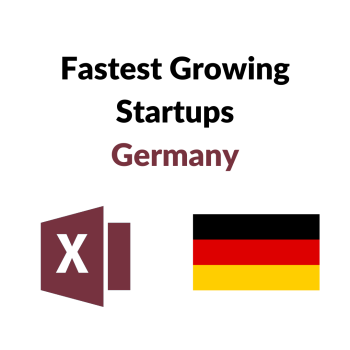Fintechs are companies that develop and market technology-driven financial innovations. In recent years, they have developed into serious competition for traditional financial service providers such as banks and insurance companies. This is also true for the top 5 financial startups presented here. Here, we define the largest fintech startups as the respective best-funded startups in Germany according to our editorial selection. This article is based on the unique List of the 200 fastest growing startups in Germany.
-
Rated 5.00 out of 5€199,99 Incl. VAT
- Download the list of Germany’s 200 fastest growing startups as an easy-to-use Excel-file
- Useful information included such as industry, detailed funding data, sales (if available), employee numbers, manager names, address, email addresses, URL, etc..
- Ideally suited for B2B lead generation in Germany, market analysis, recruiting, and more
- Download valid at any time, free updates for at least 12 months
- Last Update: 24.01.2021
1. N26 GmbH
As a young direct bank, N26 has focused on account management and payment transactions via smartphone. This is not only particularly easy and convenient, but also extremely fast. Real-time banking – processing in seconds – is part of the service promise. N26 was founded in Berlin in 2013 and launched its offering in 2015, taking its name from its first office address “Unter den Linden 26” in the capital. Today, N26 already has over five million – mostly younger – customers and offers its services in 25 countries, with a focus on Europe.
2. wefox Germany GmbH
The digital insurance platform wefox was launched in 2015 – initially focusing on the German and Swiss markets. The Berlin-based startup offers a tool that brokers can use to manage their customers’ insurance policies. At the same time, customers can check their policies and report claims via the wefox app. wefox sees itself as a digital marketplace where insureds, brokers and insurance providers can come together. In the meantime, the business has also been launched in Austria. With Italy and Spain, two southern European markets are being targeted. Over 600,000 policyholders use the app. The digital insurer One belongs to the wefox Group.
3. Raisin GmbH
Raisin GmbH has been around since 2012 and is almost a startup oldie. Founded by three former McKinsey consultants, the company has become best known in Germany for its WeltSparen brand – a digital marketplace for overnight money and fixed-term deposits in other European countries. It now also offers ETF investments under the WeltInvest brand. In 2019, Raisin acquired MHB Bank. This was originally a joint venture between Helaba and the Polish bank Handlowy, since 2005 the bank belonged to the US investment bank Lone Star. The bank now operates under the name Raisin Bank. Raisin is one of the few fintechs with its own full banking license.
4. Solarisbank AG
Solarisbank was founded in Berlin in 2016 and sees itself as a banking-as-a-service platform. The institute has a full banking license and can thus carry out all types of banking transactions. As a banking-as-a-service platform, Solarisbank primarily wants to be a service provider for other fintechs that offer financial services to their customers without having a banking license themselves. In this sense, Solarisbank acts as a background “service provider” and processor. At the end of 2019, the bank had total assets of more than EUR 435 million and employed more than 230 people.
5. Clark Germany GmbH
Berlin-based tech startup Clark is all about insurance. Founded in 2015, the young company aims to offer its users continuously optimized insurance coverage via the Clark app. To do this, an intelligent system analyses customers’ insurance data, compares it with offers from other insurance companies and shows potential for optimisation. This all works in a matter of minutes and without having to study the famous fine print in policies. According to its own information, Clark has already gained more than 200,000 users since its launch and generated over 600 million euros in premium volume. Originally focused on Germany, the company also wants to open up other European markets.
Source: Listenchampion Image source: Unsplash




